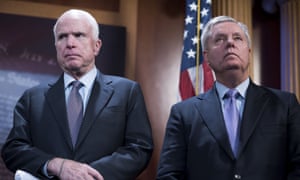US and European officials have expressed anxiety about the damage the
Trump administration’s ban targeting Muslim refugees could inflict on
western security.
The ban is believed to have been drafted by an ideologically-driven group around Donald Trump without consultation with the justice, state, defence or homeland security departments, which could have weighed on its implications for US foreign relations, as well as the country’s security concerns and legal obligations.
Officials say the clear anti-Muslim intent behind the executive order will prove to be a recruiting tool for extremist movements such as Islamic State, while alienating governments in the Arab and Islamic world, whose cooperation is essential for identifying potential terrorists.
Intelligence sharing is already threatened by uncertainty over the Trump administration’s intentions over the use of torture, on which the president has sent out mixed messages, saying he would take advice from defence secretary James Mattis, while insisting he still believes that methods such as waterboarding are effective.
There have also been reports that Israeli and British intelligence were cautioned by the outgoing Obama national security team over sharing sensitive information with the Trump team until investigations were concluded on whether they had colluded with Moscow to skew the US elections.
There is also concern about the arbitrary nature of the list of the countries affected by the ban. A western official pointed out that Muslim-majority nations where Trump has business interests – such as Egypt, Saudi Arabia and Turkey – were excluded, while noting that no terrorist attacks on US soil have been carried out by nationals of the seven countries listed in the executive order.
“From a counter-terrorism point of view, it makes no sense at all,” the official said. “This is a political act, not based on national security.”
Two of the Republican party’s leading figures on national security, senators John McCain and Lindsey Graham, issued a joint statement criticising the ban. “Ultimately, we fear this executive order will become a self-inflicted wound in the fight against terrorism,” the senators said.
“Our most important allies in the fight against [the Islamic State] are the vast majority of Muslims who reject its apocalyptic ideology of hatred. This executive order sends a signal, intended or not, that America does not want Muslims coming into our country. That is why we fear this executive order may do more to help terrorist recruitment than improve our security.”
The White House chief of staff, Reince Priebus, told NBC News on Sunday that: “Perhaps other countries needed to be added to an executive order going forward.”
According to CNN, the ban was drafted by Trump’s policy team without the usual interagency review that normally precedes publication, so the justice department was not consulted on its constitutionality. It also reported that the department of homeland security was not shown a draft until Friday. The state department sent out a cable to foreign missions on Friday saying there was not yet any guidance or press talking points available.
European embassies had been reassuring their capitals that the appointments of seemingly conventional conservative figures like James Mattis as defence secretary, John Kelly at homeland security and Rex Tillerson at the state department, would moderate the Islamophobic, nativist impulses that helped get Trump elected.
By the weekend, that looked increasingly like wishful thinking. Mattis, who had previously rejected any ban targeting Muslims on the grounds it would do “great damage” to US security and destabilise international order, stood by and watched as the new president signed it into law on Friday. Meanwhile, the White House has simply sidestepped the homeland security and state departments. Before Tillerson has even been confirmed, his department has been hobbled by a purge of senior administrative officials.

The ban is believed to have been drafted by an ideologically-driven group around Donald Trump without consultation with the justice, state, defence or homeland security departments, which could have weighed on its implications for US foreign relations, as well as the country’s security concerns and legal obligations.
Officials say the clear anti-Muslim intent behind the executive order will prove to be a recruiting tool for extremist movements such as Islamic State, while alienating governments in the Arab and Islamic world, whose cooperation is essential for identifying potential terrorists.
Intelligence sharing is already threatened by uncertainty over the Trump administration’s intentions over the use of torture, on which the president has sent out mixed messages, saying he would take advice from defence secretary James Mattis, while insisting he still believes that methods such as waterboarding are effective.
There have also been reports that Israeli and British intelligence were cautioned by the outgoing Obama national security team over sharing sensitive information with the Trump team until investigations were concluded on whether they had colluded with Moscow to skew the US elections.
There is also concern about the arbitrary nature of the list of the countries affected by the ban. A western official pointed out that Muslim-majority nations where Trump has business interests – such as Egypt, Saudi Arabia and Turkey – were excluded, while noting that no terrorist attacks on US soil have been carried out by nationals of the seven countries listed in the executive order.
“From a counter-terrorism point of view, it makes no sense at all,” the official said. “This is a political act, not based on national security.”
Two of the Republican party’s leading figures on national security, senators John McCain and Lindsey Graham, issued a joint statement criticising the ban. “Ultimately, we fear this executive order will become a self-inflicted wound in the fight against terrorism,” the senators said.
“Our most important allies in the fight against [the Islamic State] are the vast majority of Muslims who reject its apocalyptic ideology of hatred. This executive order sends a signal, intended or not, that America does not want Muslims coming into our country. That is why we fear this executive order may do more to help terrorist recruitment than improve our security.”
The White House chief of staff, Reince Priebus, told NBC News on Sunday that: “Perhaps other countries needed to be added to an executive order going forward.”
According to CNN, the ban was drafted by Trump’s policy team without the usual interagency review that normally precedes publication, so the justice department was not consulted on its constitutionality. It also reported that the department of homeland security was not shown a draft until Friday. The state department sent out a cable to foreign missions on Friday saying there was not yet any guidance or press talking points available.
European embassies had been reassuring their capitals that the appointments of seemingly conventional conservative figures like James Mattis as defence secretary, John Kelly at homeland security and Rex Tillerson at the state department, would moderate the Islamophobic, nativist impulses that helped get Trump elected.
By the weekend, that looked increasingly like wishful thinking. Mattis, who had previously rejected any ban targeting Muslims on the grounds it would do “great damage” to US security and destabilise international order, stood by and watched as the new president signed it into law on Friday. Meanwhile, the White House has simply sidestepped the homeland security and state departments. Before Tillerson has even been confirmed, his department has been hobbled by a purge of senior administrative officials.

In a further sign that the White House intends to centralise decision-making in a small group of rightwing ideologues around Trump, it was announced that Steve Bannon, the former executive of the Breitbart rightwing news website, would be taking part in national security principals meetings, which make key decisions on defence and foreign policy, but that the director of national intelligence and the chairman of joint chiefs of staff would not automatically attend.
“I am worried about the National Security Council. Who are the members of it and who are the permanent members?” McCain said on the CBS programme Face the Nation. “The appointment of Mr Bannon is something which is a radical departure from any National Security Council in history.”
Bannon, who has consistently presented himself as a disruptor of liberal democracy in the US and the world, is emerging as an increasingly powerful figure in the Trump court.
Both the French and German embassies in Washington have expressed their concerns to the White House over the past week about the efforts of Bannon and others in encouraging the far-right in Europe. It is thought that Bannon’s presence on the principals committee would strengthen the hand of national security advisor Michael Flynn, who retweeted fake news during the election and was a paid contributor to the Kremlin’s propaganda channel, Russia Today.
British officials were anxious that the order would be announced during or soon after Theresa May’s visit, when she had restated the UK’s support for keeping sanctions in place until Moscow implemented the Minsk peace agreement on Ukraine. Trump said on Friday it was “very early” to talk about lifting sanctions, but held an hour-long conversation with Vladimir Putin on Saturday which – according to the Kremlin – discussed a possible US-Russian partnership in the Middle East and Ukraine.
A senior Nato official visited the White House on Wednesday seeking to push the case for an informal summit of alliance leaders before Trump meets Putin, in order to reassure US allies, particularly in eastern Europe.

No comments:
Post a Comment